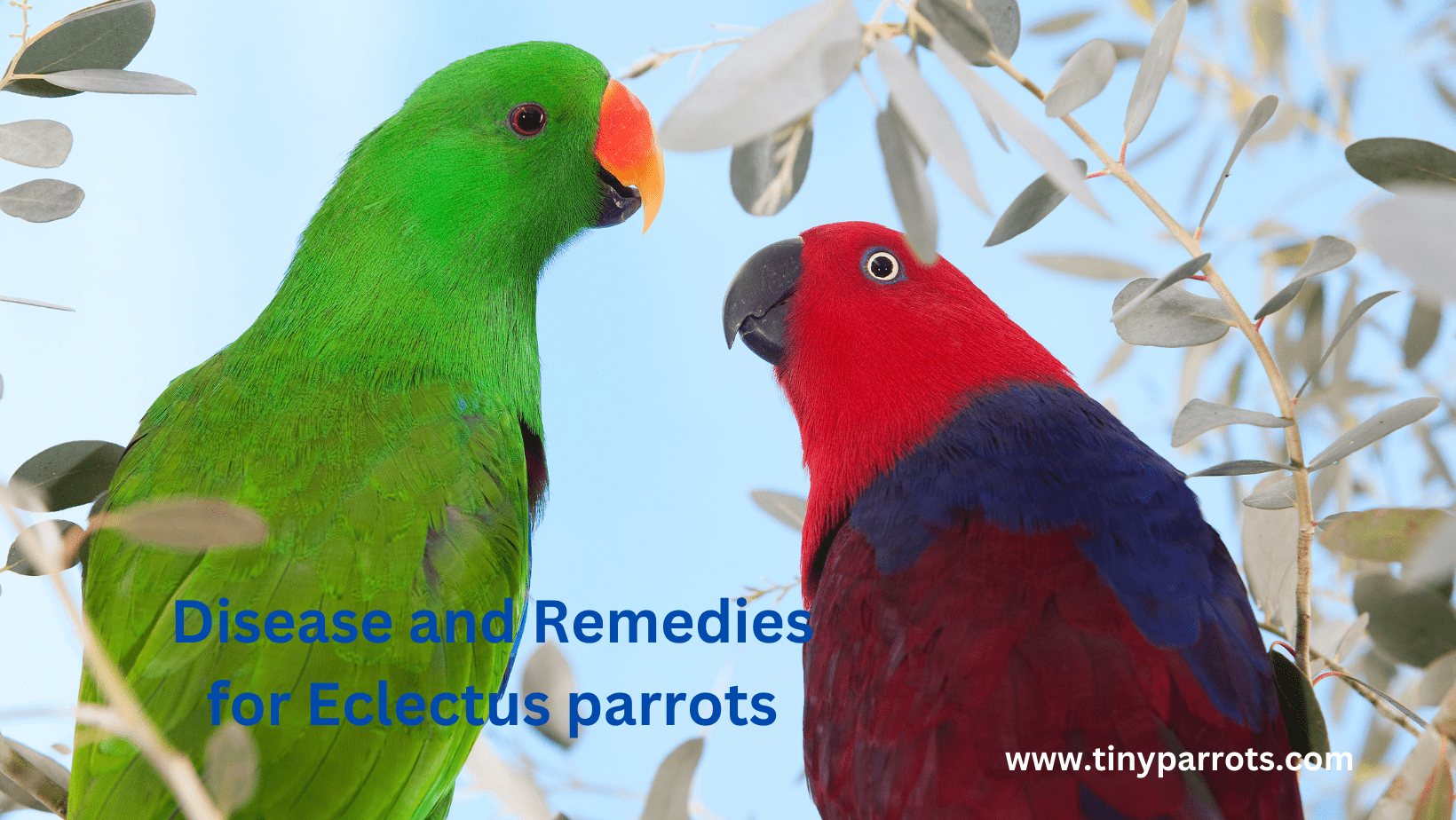If you’re a proud owner of a charming Eclectus parrot or considering becoming one, you’ve embarked on a delightful journey. These vibrant, long-tailed parrots are fascinating companions, known for their strikingly different appearances based on gender. In this comprehensive guide, we will delve into the world of Eclectus parrots, exploring their common diseases, and providing remedies and tips to ensure your feathered friend enjoys a healthy and happy life.
Understanding the Eclectus Parrot
Eclectus parrots, known for their stunning plumage and vibrant personalities, are native to the Solomon Islands, Sumba, New Guinea, and nearby islands. These medium-sized parrots are famous for their sexually dimorphic characteristics, with males displaying bright green feathers and females showcasing a brilliant mix of red and blue.
Common Diseases in Eclectus Parrots
Owning a pet comes with responsibilities, and it’s crucial to understand the common diseases that can affect your Eclectus parrot. These may include:
- Psittacine Beak and Feather Disease (PBFD) PBFD is a viral disease that primarily affects parrots, causing feather loss and beak abnormalities. Regular vet check-ups can help diagnose and manage this condition.
- Polyomavirus Polyomavirus can lead to feather abnormalities, weight loss, and even death in Eclectus parrots. Early detection is essential for treatment.
- Proventricular Dilatation Disease (PDD) PDD is a neurological disease that affects a parrot’s digestive system, leading to malnutrition. A healthy diet can lower the risk.
- Respiratory Infections Just like humans, parrots can suffer from respiratory infections. Ensure a clean and well-ventilated environment for your feathered friend.
Avian Vet Visits: The Key to a Healthy Parrot
Regular visits to an avian veterinarian are paramount in ensuring your Eclectus parrot’s well-being. These specialized professionals can diagnose diseases early, provide vaccinations, and offer expert guidance on nutrition and care.
Nutrition Matters: Feeding Your Eclectus Parrot
A well-balanced diet is the foundation of your parrot’s health. Eclectus parrots have unique nutritional requirements, so consider the following when feeding them:
- Fresh Fruits and Veggies A substantial part of their diet should consist of fresh fruits and vegetables like papaya, carrots, and leafy greens.
- High-Quality Pellets Offer premium parrot pellets as a source of essential nutrients.
- Hydration Ensure fresh water is available at all times, especially during hot weather.
Parrot-Proofing Your Home
Just as you would baby-proof your home, parrot-proofing is essential for your Eclectus parrot’s safety. These curious birds love to explore, and it’s important to:
- Remove Toxic Plants Some common houseplants can be toxic to parrots. Look for them in your house and get rid of them.
- Secure Electrical Cords Parrots love to chew on things, including cords. Ensure these are out of reach.
- Avoid Small Objects Small objects can pose a choking hazard. Keep them away from your parrot’s play area.
The Importance of Mental Stimulation
Eclectus parrots are highly intelligent and need mental stimulation to thrive. Provide toys, puzzles, and regular interaction to keep their minds active and happy.
Grooming and Hygiene
Grooming is an essential part of parrot care. Regularly trim their nails and beak, and offer a birdbath for them to enjoy. A clean and well-groomed parrot is a happy one.
Breeding Eclectus Parrots: A Complex Task
Breeding Eclectus parrots is a complex undertaking best left to experienced breeders. It involves proper nutrition, nesting boxes, and close monitoring of the breeding pair’s health.
Socializing and Bonding
Eclectus parrots are social creatures that thrive on companionship. Spend quality time with your parrot, talk to them, and build a strong bond. A happy, well-socialized parrot is less likely to develop behavioral problems.
Conclusion: A Happy, Healthy Eclectus Parrot
In conclusion, owning an Eclectus parrot can be an incredibly rewarding experience. These charming birds can become beloved members of your family with the right care and attention. Remember, regular avian vet visits, a balanced diet, and a stimulating environment are keys to their well-being.
FAQs
1. What’s the lifespan of an Eclectus parrot?
Eclectus parrots have a lifespan of approximately 30-50 years, making them a long-term commitment.
2. How do I prevent my parrot from getting bored?
Keep your parrot engaged with a variety of toys and regular interaction. Rotate their toys to maintain their interest.
3. Can Eclectus parrots learn to talk?
Yes, they are excellent talkers and can learn a wide vocabulary. Spend time teaching them words and phrases.
4. Are Eclectus parrots prone to obesity?
Yes, they can be. To avoid obesity, keep an eye on their nutrition and make sure they receive adequate exercise.
5. Do they require special care during breeding season?
Yes, breeding Eclectus parrots is a delicate process. Ensure they have a suitable nesting area and monitor their health closely.
By following the guidelines provided in this article, you can ensure that your Eclectus parrot lives a long, healthy, and happy life. Whether you’re new to parrot ownership or a seasoned parrot enthusiast, your feathered friend will appreciate your care and attention.
